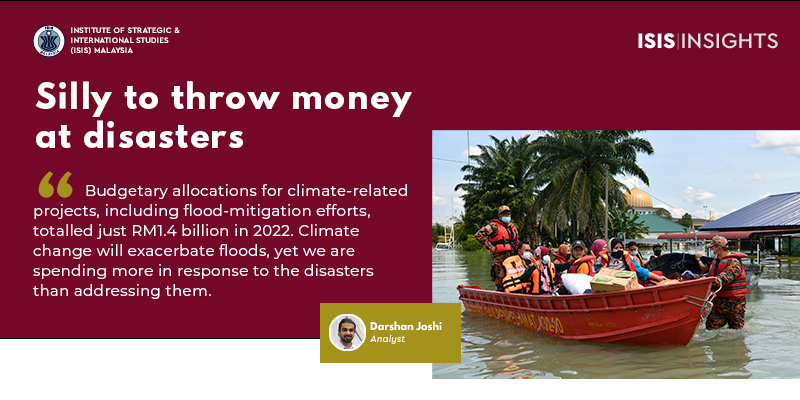Climate change demands better planning, bigger budgets to address flooding, pandemic
THE Lunar New Year two years ago took place in what feels like a different world. Since then, we’ve had political transitions, a pandemic and we’ve endured some degree of social isolation and economic contraction. We’ve seen increases in the cost of living accompanied by plummeting incomes, a slowing economy and rising inequality.
And all this happened before Malaysia was struck by “once-in-100-years” floods, which may have been one in 100 in the past but would be commonplace from now on.
The past two years have been a crash course in Malaysia’s disaster planning, management, and response, and the worst is far from over. Covid-19 will probably abate at some stage. But another virus might take its place sometime and, in the meantime, the threat of climate change isn’t only growing – it’s here. We might realise it now that the 2020s have ushered in an age of disaster.
Whether these disasters are due to economic or geopolitical happenstances or induced or exacerbated by climate change, one thing is for certain: Malaysia has some way to go to ensure its resilience against headwinds coming our way.
The pandemic’s toll has been grave. About 10% of the population has, at some point, been infected. More than 31,000 have died of Covid-19. But its consequences are not limited to lives lost or days spent hospitalised. And while the indirect, economic and emotional trauma of two years of stop-start economic activity has created significant, short-term consequences, these may be insignificant when one considers the long-term costs of the pandemic.
Last month, EPF reported that contributors withdrew RM101 billion with some 3.6 million Malaysians left with less than RM1,000 in their provident funds. The bulk of pandemic-related suffering has been borne by the B40. The irony is that not only have the pandemic and lockdowns worsened their plight but how we went about coping with the repercussions has set those at the bottom of the socio-economic ladder further back still.
This came despite stimulus packages worth some RM530 billion, compared with Budget 2020, which amounted to RM297billion.
The frightening thing is that if our response to the first disaster of the 2020s entailed throwing crazy money at the problem,then what do we have left for the next one?
The floods offered a second, fresher test. We’re probably still counting the economic costs. Estimates indicate that the damages may run up to RM6.5 billion without factoring output losses. Other costs may arise, as the Meteorological Department projects heavy rainfall well into March with the risk of further flooding.
These costs may pale in comparison to the Covid-related stimulus spending but are still significant. Budgetary allocations towards climate-related projects, including flood-mitigation efforts, forestry and biodiversity conservation and low-carbon energy programmes, totalled just RM1.4 billion in 2022. Climate change will exacerbate floods, yet we are spending more in respond to the disasters than addressing them in the first place.
Flooding routinely creates economic damage running into the billions of ringgit. In 2014, floods caused property damage ofmore than RM2 billion with the government responding with some RM1.5 billion. So, why are we still caught flat-footed whenever disasters strike? As temperatures rise and weather extremes worsen, the situation will become more challenging.
As we look ahead to a future of more disasters, one thing is certain: a sizeable proportion of Malaysians are ill-equipped to face challenges that may arise. Our habitual post-response of throwing money at problems is costly and unsustainable.
Instead, we need an active, pre-emptive approach. It starts with offering low-income households more opportunities to survive difficulties. We must find ways to enhance economic security: wages must rise to combat Covid-induced inflation. We need to enhance social protections, as existing aid falls far short of what is needed to improve the lot of lower-income Malaysians. Targeted basic-income schemes would be a start.
We need to boost the budget on climate resiliency. Rising temperatures will exacerbate rainfall and floods, threaten food and water security, challenge public health and our healthcare capacity and infrastructure. These will have direct and indirect economic consequences and the least we can do is ensure that the next time disaster strikes, we’re ready for it and not stuck scrambling, clutching and drowning.





